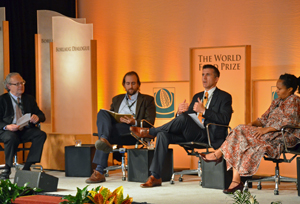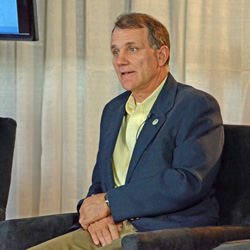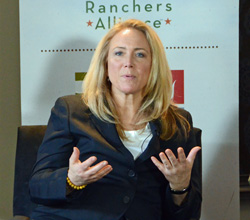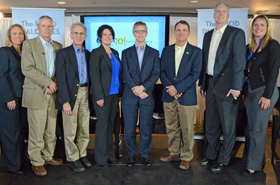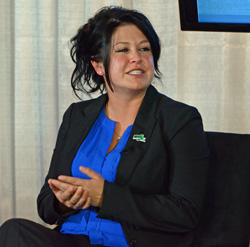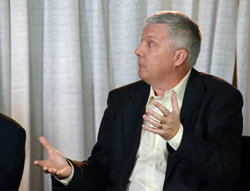 USFRA’s Boston Food Dialogues panelists came from the east and the west, represented the big and the small, work in agribusinesses and in small farming communities.
USFRA’s Boston Food Dialogues panelists came from the east and the west, represented the big and the small, work in agribusinesses and in small farming communities.
Michael Swanson, Agricultural Economist for Wells Fargo Bank NA, Minneapolis, Minnesota and Bruce Rominger, Rominger Brothers Farm, Winters, California were two panelists Chuck had the chance to speak with after the recent Boston Food Dialogues.
At Wells Fargo, Michael analyzes the impact of energy on agriculture, forecasting for key agricultural commodities, such as wheat, soybeans, corn and cotton, as well as livestock sectors such as cattle, dairy and hogs. Michael stated that he feels there is a strong demand for smaller farms and coming from the Midwest he said, “maybe we don’t appreciate it enough.”
“We go where the best technology takes us. We want the best solutions for the dollar. The consumers chooses and shouldn’t criticizes them one way or the other.”
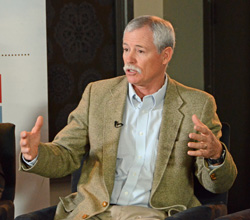 Bruce is a 5th generation farmer working along side his brother in a progressive, diversified family farm and ranch. They specialize in crops using organic and conventional techniques, including winegrapes, processing tomatoes, rice, wheat, corn, safflower, sunflower, onions, alfalfa and oat hay. Bruce agrees that small farms are a good thing, but feels the conversation led to a desire for diversity. He continued, “Small farms aren’t going to be viable in Nebraska. And where I am and the crops I grow and with the technology I use they aren’t very viable in our area either.”
Bruce is a 5th generation farmer working along side his brother in a progressive, diversified family farm and ranch. They specialize in crops using organic and conventional techniques, including winegrapes, processing tomatoes, rice, wheat, corn, safflower, sunflower, onions, alfalfa and oat hay. Bruce agrees that small farms are a good thing, but feels the conversation led to a desire for diversity. He continued, “Small farms aren’t going to be viable in Nebraska. And where I am and the crops I grow and with the technology I use they aren’t very viable in our area either.”
“My brother and I own our farm and statistically we are a big farm, but we are a family farm. We are incorporated, does that make us a corporate farm? Technically yes, but we are 100% owned and managed by our family. To us this growth has been an evolution in every process over generations. This is something we have to do to stay successful it the markets we are in.”
You can listen to Chuck’s complete interview with Michael and Bruce here: Interview with Bruce Rominger and Michael Swanson
Boston Food Dialogues Photo Album
 As House and Senate leaders head into a farm bill conference meeting, Sen. Amy Klobuchar provides keen insight on the negotiations. She says the challenge is to merge the reductions in spending, contained in the House of Representatives Farm Bill, with the more moderate reductions in the Senate bill and to mediate those provisions in the final bill. She discusses the prospect of rolling the entire farm bill into a larger budget bill and how large a reduction there can be in nutrition spending without risking a presidential veto. Finally, she discusses a provision of the WRDA bill that would permanently close the Upper St. Anthony Lock on the Mississippi River to block Asian Carp from penetrating northern Minnesota rivers and lakes.
As House and Senate leaders head into a farm bill conference meeting, Sen. Amy Klobuchar provides keen insight on the negotiations. She says the challenge is to merge the reductions in spending, contained in the House of Representatives Farm Bill, with the more moderate reductions in the Senate bill and to mediate those provisions in the final bill. She discusses the prospect of rolling the entire farm bill into a larger budget bill and how large a reduction there can be in nutrition spending without risking a presidential veto. Finally, she discusses a provision of the WRDA bill that would permanently close the Upper St. Anthony Lock on the Mississippi River to block Asian Carp from penetrating northern Minnesota rivers and lakes. 

